高二人教版英语必修五unit1复习教案
人教版英语必修五 Unit 1 全单元教案
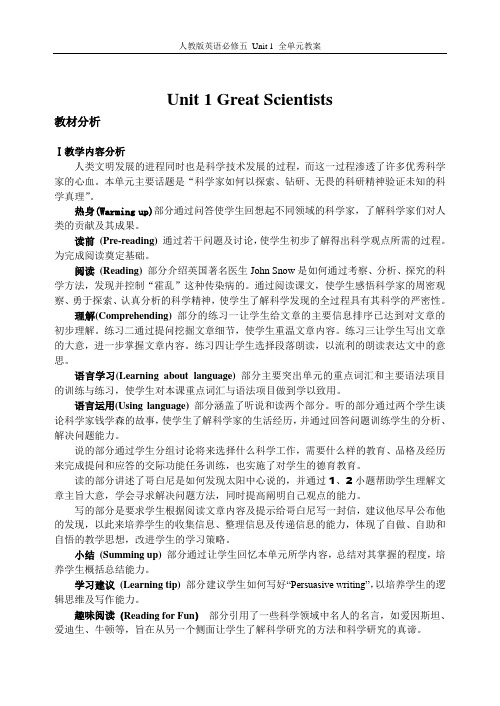
Unit 1 Great Scientists教材分析Ⅰ教学内容分析人类文明发展的进程同时也是科学技术发展的过程,而这一过程渗透了许多优秀科学家的心血。
本单元主要话题是“科学家如何以探索、钻研、无畏的科研精神验证未知的科学真理”。
热身(Warming up)部分通过问答使学生回想起不同领域的科学家,了解科学家们对人类的贡献及其成果。
读前(Pre-reading) 通过若干问题及讨论,使学生初步了解得出科学观点所需的过程。
为完成阅读奠定基础。
阅读(Reading) 部分介绍英国著名医生John Snow是如何通过考察、分析、探究的科学方法,发现并控制“霍乱”这种传染病的。
通过阅读课文,使学生感悟科学家的周密观察、勇于探索、认真分析的科学精神,使学生了解科学发现的全过程具有其科学的严密性。
理解(Comprehending) 部分的练习一让学生给文章的主要信息排序已达到对文章的初步理解。
练习二通过提问挖掘文章细节,使学生重温文章内容。
练习三让学生写出文章的大意,进一步掌握文章内容。
练习四让学生选择段落朗读,以流利的朗读表达文中的意思。
语言学习(Learning about language) 部分主要突出单元的重点词汇和主要语法项目的训练与练习,使学生对本课重点词汇与语法项目做到学以致用。
语言运用(Using language) 部分涵盖了听说和读两个部分。
听的部分通过两个学生谈论科学家钱学森的故事,使学生了解科学家的生活经历,并通过回答问题训练学生的分析、解决问题能力。
说的部分通过学生分组讨论将来选择什么科学工作,需要什么样的教育、品格及经历来完成提问和应答的交际功能任务训练,也实施了对学生的德育教育。
读的部分讲述了哥白尼是如何发现太阳中心说的,并通过1、2小题帮助学生理解文章主旨大意,学会寻求解决问题方法,同时提高阐明自己观点的能力。
写的部分是要求学生根据阅读文章内容及提示给哥白尼写一封信,建议他尽早公布他的发现,以此来培养学生的收集信息、整理信息及传递信息的能力,体现了自做、自助和自悟的教学思想,改进学生的学习策略。
人教高中英语必修五:Unit+1教案-1.doc
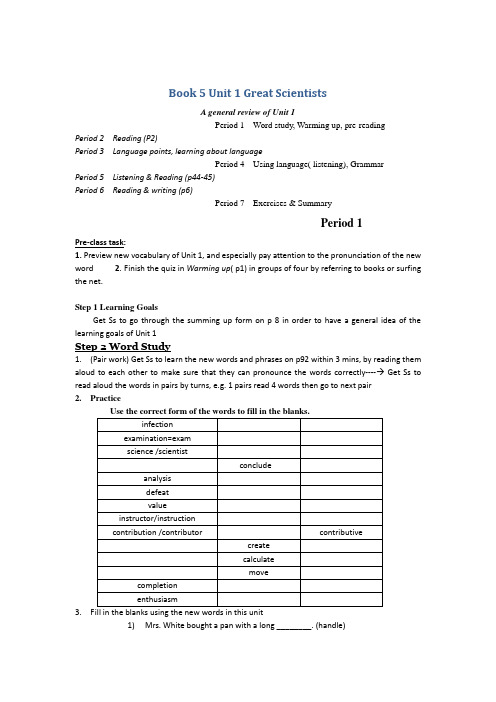
Book 5 Unit 1 Great ScientistsA general review of Unit 1Period 1 Word study, Warming up, pre-readingPeriod 2 Reading (P2)Period 3 Language points, learning about languagePeriod 4 Using language( listening), GrammarPeriod 5 Listening & Reading (p44-45)Period 6 Reading & writing (p6)Period 7 Exercises & SummaryPeriod 1Pre-class task:1. Preview new vocabulary of Unit 1, and especially pay attention to the pronunciation of the new word2. Finish the quiz in Warming up( p1) in groups of four by referring to books or surfing the net.Step 1 Learning GoalsGet Ss to go through the summing up form on p 8 in order to have a general idea of the learning goals of Unit 1Step 2 Word Study1. (Pair work) Get Ss to learn the new words and phrases on p92 within 3 mins, by reading them aloud to each other to make sure that they can pronounce the words correctly---- Get Ss to read aloud the words in pairs by turns, e.g. 1 pairs read 4 words then go to next pair2. Practice3.1)Mrs. White bought a pan with a long ________. (handle)2)The pollution is so ________ that we have to take some measures to stop it.(severe)3)He has a big nose that is a ________ of his family. (characteristic)4)Water and salt are ________ into our blood stream every day. (absorbed)5)If a doctor or a medical treatment ________ someone’s illness, they make theperson well again. (cure)6) A ________ is a kind of germ that can cause disease. (virus)Step 3. Warming up(Group competition) Check the answers to the quiz to find out which group know the most . Show pictures to introduce some scientists while Ss giving the correct answers-- congratulations to the winning groupStep 4 Pre-reading1. (Pair work) What five most important qualities do you think a scientist should have? Give reasons.clever/talented strict patient creative determined/strong-willed positivehonest energetic intelligent/hard-working ambitious careful co-operativeconfident brave2. (Group work) Ex2, p1Do you know how to prove a new idea in scientific research? Discuss in groups the stages in examining a new scientific idea. What order would you put them in?Draw a conclusion Think of a method Collect results Make up a question Find a problem Analyse the results Repeat if necessaryStep 5. Summary1.Seeing much, suffering much, and studying much are three pillars (支柱,要素) of learning.2.learning without thought is a labour lost; thought without learning is perilous(危险的)3. To know the disease is half the cure. 找出病根等于医治了一半。
高二英语必修5 unit 1-2复习教学案
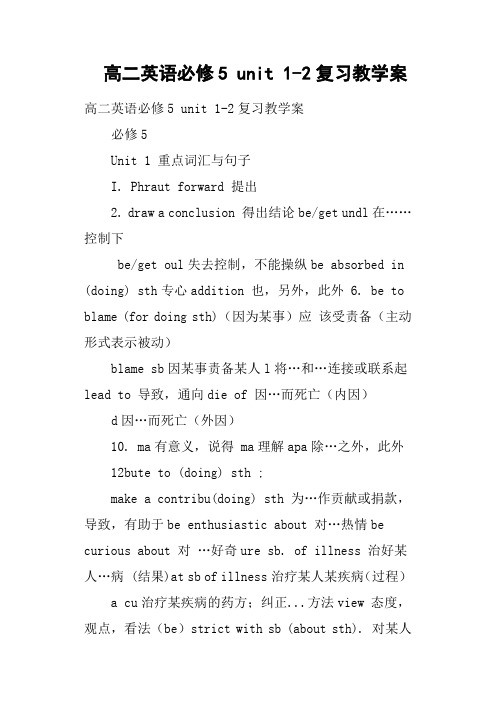
高二英语必修5 unit 1-2复习教学案高二英语必修5 unit 1-2复习教学案必修5Unit 1 重点词汇与句子I. Phraut forward 提出2. draw a conclusion 得出结论be/get undl在……控制下be/get oul失去控制,不能操纵be absorbed in (doing) sth专心addition 也,另外,此外 6. be to blame (for doing sth)(因为某事)应该受责备(主动形式表示被动)blame sb因某事责备某人l将…和…连接或联系起lead to 导致,通向die of 因…而死亡(内因)d因…而死亡(外因)10. ma有意义,说得 ma理解apa除…之外,此外 12bute to (doing) sth ;make a contribu(doing) sth 为…作贡献或捐款,导致,有助于be enthusiastic about 对…热情be curious about 对…好奇ure sb. of illness 治好某人…病 (结果)at sb of illness治疗某人某疾病(过程) a cu治疗某疾病的药方;纠正...方法view 态度,观点,看法(be)strict with sb (about sth). 对某人(某事)要求严格xpose … to …使显露,暴露be exposed显露,暴露于20. lead to (doing) sth 导致,通向21. l调查,研究22. thousands of 成千上万23. be dd to do 下定决心做某事24. suspecbt sb of (doing) sth 怀疑某人(做)某事2uct sb to do sth 命令,指导某人做某事26.be unduction 正在建设中 2al chara物理特征2arch 科学研究2us diseases 传染性疾Ⅱ约翰斯诺是伦敦一位著名的医生――他的确医术精湛,因而成为维多利亚女王的私人大夫。
人教版英语必修五Unit 1(John Snow defeats_King Cholera)教学教案
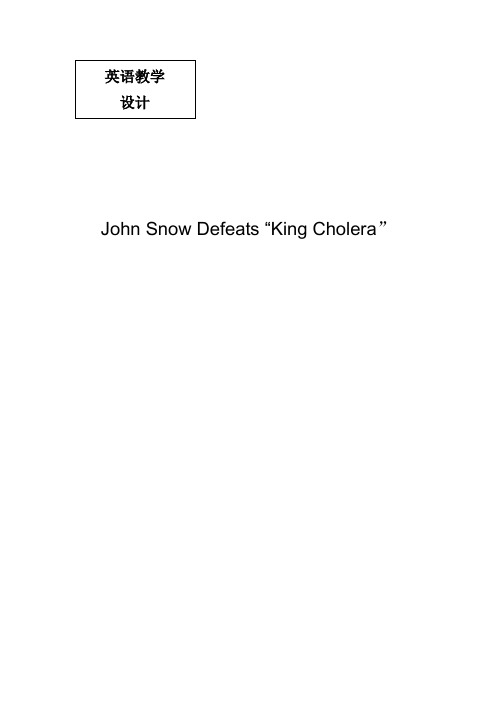
John Snow Defeats “King Cholera”Unit 1 John Snow Defeats “King Cholera”Teaching Goals:1. Enable the Ss to get to know some knowledge about Cholera.2. Enable the Ss to understand the passage well.3. Let the Ss learn some reading skills by scanning and skimming.4. To learn from the great scientists and develop the noble spirits . key points:1. To train the reading skills of skimming, scanning and careful reading;2. To master the details of the passage and appreciate the spirits of the scientists.Difficult points1. To develop the students’ ability of grasping the main idea of each paragraph.2. To get some detailed information by reading the text. Teaching methods1. Skimming & scanning2. Discussion methods3. Pair work of group4. CompetitionTeaching process:Step 1 Lead in本单元标题是伟大的科学家。
所以活动的设置为让学生说出自己熟知的科学家姓名、其发明、工作、生活的情况。
高二英语必修5unit1-2复习教学案(标准版)
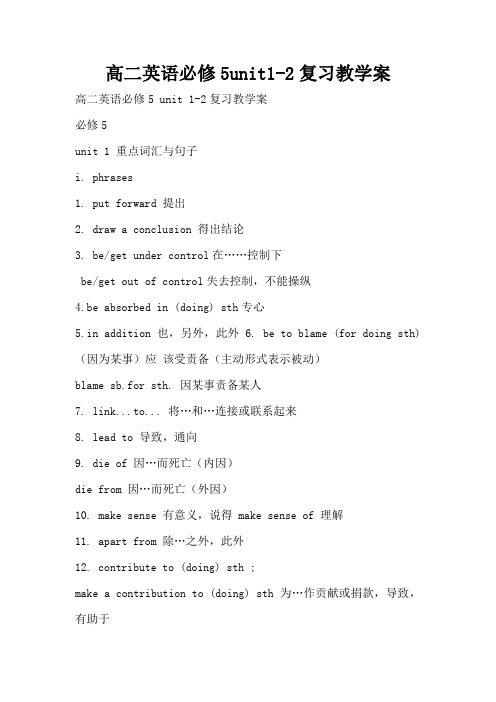
高二英语必修5unit1-2复习教学案高二英语必修5 unit 1-2复习教学案必修5unit 1 重点词汇与句子i. phrases1. put forward 提出2. draw a conclusion 得出结论3. be/get under control在……控制下be/get out of control失去控制,不能操纵4.be absorbed in (doing) sth专心5.in addition 也,另外,此外6. be to blame (for doing sth)(因为某事)应该受责备(主动形式表示被动)blame sb.for sth. 因某事责备某人7. link...to... 将…和…连接或联系起来8. lead to 导致,通向9. die of 因…而死亡(内因)die from 因…而死亡(外因)10. make sense 有意义,说得 make sense of 理解11. apart from 除…之外,此外12. contribute to (doing) sth ;make a contribution to (doing) sth 为…作贡献或捐款,导致,有助于13. be enthusiastic about 对…热情14. be curious about 对…好奇15. cure sb. of illness 治好某人…病 (结果)treat sb of illness治疗某人某疾病(过程)a cure of sth 治疗某疾病的药方;纠正...方法16. point of view 态度,观点,看法17.(be)strict with sb (about sth). 对某人(某事)要求严格19.expose … to …使显露,暴露be exposed to sth 显露,暴露于20. lead to (doing) sth 导致,通向21. look into 调查,研究22. thousands of 成千上万23. be determined to do 下定决心做某事24. suspecbt sb of (doing) sth 怀疑某人(做)某事25. instruct sb to do sth 命令,指导某人做某事26.be under construction 正在建设中27.physical characteristics 物理特征 28.scientific research 科学研究29.infectious diseases 传染性疾ⅱ.sesentences1. 约翰•斯诺是伦敦一位著名的医生――他的确医术精湛,因而成为维多利亚女王的私人大夫。
必修五 Unit1教案
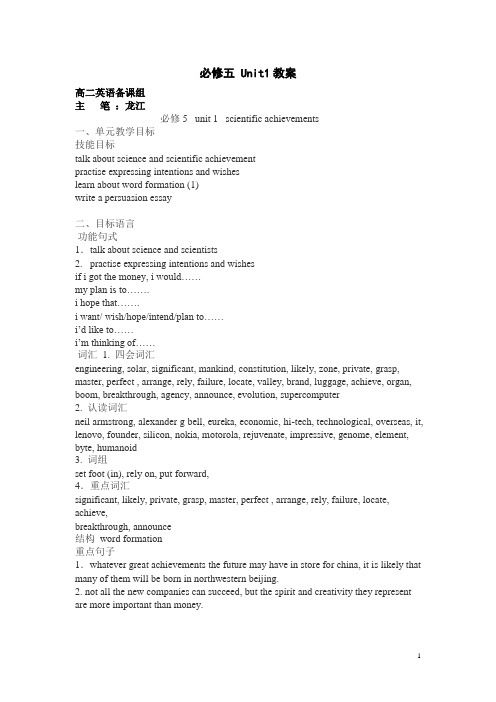
必修五 Unit1教案高二英语备课组主笔:龙江必修5 unit 1 scientific achievements一、单元教学目标技能目标talk about science and scientific achievementpractise expressing intentions and wisheslearn about word formation (1)write a persuasion essay二、目标语言功能句式1.talk about science and scientists2. practise expressing intentions and wishesif i got the money, i would……my plan is to…….i hope that…….i want/ wish/hope/intend/plan to……i’d like to……i’m thinking of……词汇1. 四会词汇engineering, solar, significant, mankind, constitution, likely, zone, private, grasp, master, perfect , arrange, rely, failure, locate, valley, brand, luggage, achieve, organ, boom, breakthrough, agency, announce, evolution, supercomputer2. 认读词汇neil armstrong, alexander g bell, eureka, economic, hi-tech, technological, overseas, it, lenovo, founder, silicon, nokia, motorola, rejuvenate, impressive, genome, element, byte, humanoid3. 词组set foot (in), rely on, put forward,4.重点词汇significant, likely, private, grasp, master, perfect , arrange, rely, failure, locate, achieve,breakthrough, announce结构word formation重点句子1.whatever great achievements the future may have in store for china, it is likely that many of them will be born in northwestern beijing.2. not all the new companies can succeed, but the spirit and creativity they represent are more important than money.三、教材分析与教材重组1. 教材分析通过学习了解人类的科学成就,帮助学生认识到这些成就深刻地改变了人类生产和生活的方式及质量,同时也深刻地改变了人类的思维观念和对世界的认识,改变并继续改变着世界的面貌,极大地推动了社会的发展。
人教版英语必修五 Unit 1 教案
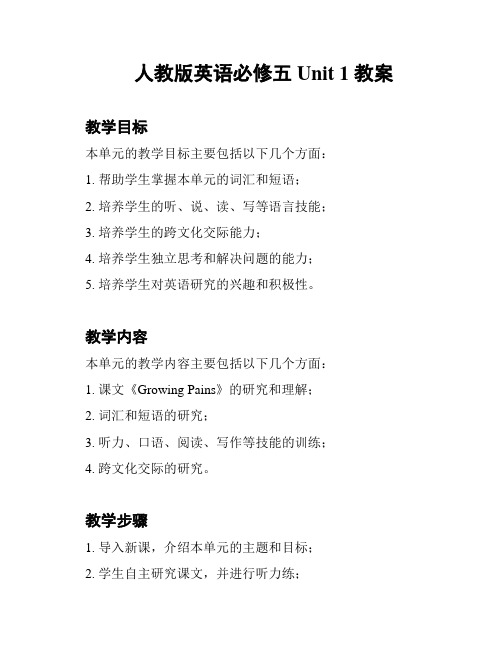
人教版英语必修五 Unit 1 教案教学目标本单元的教学目标主要包括以下几个方面:1. 帮助学生掌握本单元的词汇和短语;2. 培养学生的听、说、读、写等语言技能;3. 培养学生的跨文化交际能力;4. 培养学生独立思考和解决问题的能力;5. 培养学生对英语研究的兴趣和积极性。
教学内容本单元的教学内容主要包括以下几个方面:1. 课文《Growing Pains》的研究和理解;2. 词汇和短语的研究;3. 听力、口语、阅读、写作等技能的训练;4. 跨文化交际的研究。
教学步骤1. 导入新课,介绍本单元的主题和目标;2. 学生自主研究课文,并进行听力练;3. 进行课文的理解和讨论,引导学生思考和表达观点;4. 研究和掌握本单元的词汇和短语;5. 进行听说训练,提高学生的口语表达能力;6. 进行阅读和写作训练,培养学生的阅读理解和写作技能;7. 进行跨文化交际的研究,增进学生对英语和其他文化的认识。
教学评价本单元的教学评价主要以以下方式进行:1. 各种形式的课堂练和作业,检测学生对知识的掌握程度;2. 口语和写作表现的评价,评估学生语言运用的能力;3. 学生参与课堂讨论和发言的情况,评估学生的思维能力和表达能力。
教学资源本单元的教学资源包括以下几个方面:1. 课本《人教版英语必修五》;2. 音频材料;3. 多媒体设备;4. 教学课件和作业练册。
以上为《人教版英语必修五 Unit 1 教案》的简要内容,旨在帮助教师设计和安排本单元的教学活动。
具体的教学步骤和细节应根据实际情况进行调整和完善。
英语优秀教案(人教版):必修五(Unit 1 Great scientists Period 1)
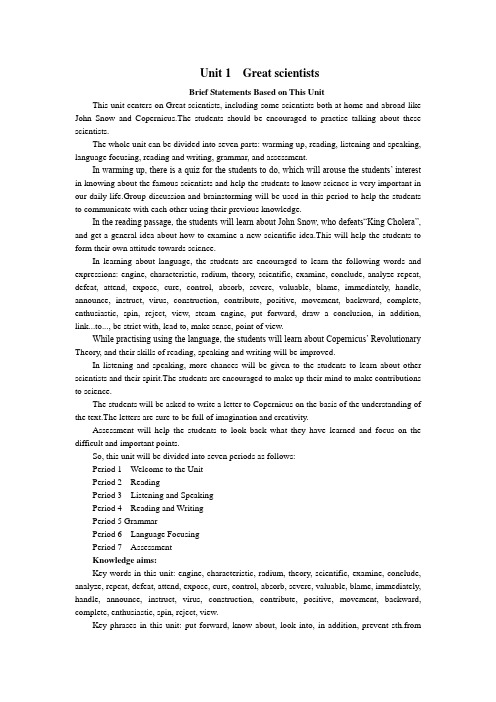
Unit 1Great scientistsBrief Statements Based on This UnitThis unit centers on Great scientists, including some scientists both at home and abroad like John Snow and Copernicus.The students should be encouraged to practise talking about these scientists.The whole unit can be divided into seven parts: warming up, reading, listening and speaking, language focusing, reading and writing, grammar, and assessment.In warming up, there is a quiz for the students to do, which will arouse the students’ interest in knowing about the famous scientists and help the students to know science is very important in our daily life.Group discussion and brainstorming will be used in this period to help the students to communicate with each other using their previous knowledge.In the reading passage, the students will learn about John Snow, who defeats“King Cholera”, and get a general idea about how to examine a new scientific idea.This will help the students to form their own attitude towards science.In learning about language, the students are encouraged to learn the following words and expressions: engine, characteristic, radium, theory, scientific, examine, conclude, analyze repeat, defeat, attend, expose, cure, control, absorb, severe, valuable, blame, immediately, handle, announce, instruct, virus, construction, contribute, positive, movement, backward, complete, enthusiastic, spin, reject, view, steam engine, put forward, draw a conclusion, in addition, link...to..., be strict with, lead to, make sense, point of view.While practising using the language, the students will learn about Copernicus’ Revolutionary Theory, and their skills of reading, speaking and writing will be improved.In listening and speaking, more chances will be given to the students to learn about other scientists and their spirit.The students are encouraged to make up their mind to make contributions to science.The students will be asked to write a letter to Copernicus on the basis of the understanding of the text.The letters are sure to be full of imagination and creativity.Assessment will help the students to look back what they have learned and focus on the difficult and important points.So, this unit will be divided into seven periods as follows:Period 1Welcome to the UnitPeriod 2ReadingPeriod 3Listening and SpeakingPeriod 4Reading and WritingPeriod 5 GrammarPeriod 6Language FocusingPeriod 7AssessmentKnowledge aims:Key words in this unit: engine, characteristic, radium, theory, scientific, examine, conclude, analyze, repeat, defeat, attend, expose, cure, control, absorb, severe, valuable, blame, immediately, handle, announce, instruct, virus, construction, contribute, positive, movement, backward, complete, enthusiastic, spin, reject, view.Key phrases in this unit: put forward, know about, look into, in addition, prevent sth.fromdoing, lead to, make sense, punish sb.for, suggest doing sth.steam engine, draw a conclusion, link...to..., be strict with, lead to, point of view.Key sentence patterns:1 But he became inspired when he thought about helping ordinary people exposed to cholera.2 He got interested in two theories explaining how cholera killed people.3 Only if you put the sun there did the movements of the other planets in the sky make sense.Grammar in this unit:Past participle used as attribute and predicativeAbility aims:1.To talk about great scientists and their great achievements.2.To guess what will be talked about in the listening materials.3.To improve their reading skills.4.To learn to use past participle as attribute and predicative.Emotion aims:To encourage the students to learn about some great scientists and their great achievements and how science helps to improve our society and change our life.Meanwhile, inspire the students to learn from the scientists and form their positive attitude towards science.Period 1Welcome to the UnitThe General Idea of This PeriodThe uni t centers on“great scientists”.This is the first period of this unit.During this period, the students should be encouraged to give their previous knowledge of some of the famous scientists, participate in the activities in class and try to get more information from the discussion.They will take part in different forms of activities, including pair work, group work, competition, and quiz.Group competition will be carried out all through the class.Words and expressions in this unit will help the students to talk about the topic“great scientists”.So at the beginning of this period, the teacher should spend some time training the students to read them and help the students pronounce them correctly.The students are encouraged to learn the new words in groups by themselves, using dictionaries and other reference books.Then more time should be given to the students to get familiar with the words and stly, several sentences will be given to the students to help them to know how to use some of the phrases.This unit is about“great scientists”, so from the very beginning, the teacher can encourage the students talk about their dreams in the future.Then the teacher can let the students brainstorm something about great scientists.The students are free to say anything that they know.The students will be quite interested in this topic.This activity gives the students a chance to express their feelings about their favorite scientist.At the same time, this activity can stir the students’ enthusiasm in science.Then the teacher can have the students match the famous scientists with their discoveries, inventions or theories, making sure that they have some common sense about some world-famous scientists.Later the students will be divided into several groups, describe one of the great scientists and let other students guess who he or she is talking about.In this way, the students should learn to organize their own sentences and express their ideas clearly.After that, the students will feel comfortable to do the quiz in the text.The students should beencouraged to give more information about these ten scientists.Meanwhile, the students’ interest in scientists and science should be cultivated.So two topic discussion questions, as well as the practice exercises are designed.The post-class activities are designed to arouse the students’ interest in science and encourage them to“DIY—do it yourself” in their daily life if they have some doubt in some areas.T eaching Important PointsHave the students discuss great scientists.Encourage the students to hold their views about their future career.Understand and learn the following words and expressions: engine, characteristic, radium, theory, scientific, examine, conclude, analyse, repeat, defeat, attend, expose, cure, control, absorb, severe, valuable, blame, immediately, handle, announce, instruct, virus, construction, contribute, positive, movement, backward, complete, enthusiastic, spin, reject, view, steam engine, put forward, draw a conclusion, in addition, link...to..., be strict with, lead to, make sense, point of view.T eaching DifficultiesWhat can we learn from the scientists?What should we do in our daily life to develop our interest and love for science?T eaching AidsCAI equipment with a Multi-media classroom and other normal teaching tools.Three Dimensional T eaching AimsKnowledge AimsLearn something about some famous scientists in the world.Know about the outstanding discoveries, inventions and theories from some well-known scientists.Try to understand and learn the important words and expressions.Ability AimsDevelop the students’ ability of speaking.Encourage the students to give more information about the great scientists.Emotional AimsEncourage the students to learn more about the great scientists and learn from them.Help the students to form the good habit in learning and encourage the students to take part in social practice.Help the students to realize that it is scientific spirit that makes those scientists successful.Encourage the students to develop their love for science.T eaching ProcedureStep 1 GreetingTeacher: Hello, everyone.Teacher: Hello, Mr.../Ms...Step 2 Lead inT: I’m very glad to see you all here.After a long holiday, all of you look energetic and happy.I hope that we will work hard together happily all through the year.I do believe that a bright future is waiting for you.We are sure to realize our dreams in the near future.By the way, I’d like to know what you would like to be in the future.Let me share your dreams.Anyone who gives your idea will get a star for your group.Ready?Go!S: I admire Y ang Liwei very much, who is a great honour to our motherland.I’d like to be an astronaut like him.T: Y eah, the spacecraft, Shenzhou V, orbited the earth 14 times in 21 hours, making China the third country to have successfully sent an astronaut into space.I hope you will realize your dream.S: I want to be a doctor.I hope I’ll be an outstanding one and be expert in finding cures for different kinds of cancers.T: That’s a good idea.There are so many patients with cancers in the world, who are suff ering a lot.Thank you!S: I want to be an English teacher like you.For one thing, I like English very much; for another, you are not only strict with us but also patient with us.Y ou are just our friends and maybe more than our friends sometimes.T: I’m really glad to hear that.It’s my great honor to be your friends and I like my job very much.S: I’d like to be an expert in environment.Y ou see, with the development of industry, our globe is seriously polluted.Dirty water, polluted air, and loud noise make our living conditions worse.I think we should leave a beautiful world to the next generation.T: Y es, someone predicted that the last drop of water in the world would be the tear of human being’s.I think all of us should pay attention to our environment, and make our contributions to improving the environment.S: I’m so interested in physics.And I have read Stephen Hawking’s A Brief History of Time twice.I hope I will be a scientist like him.As we all know, the development of our society will go hand in hand with the development of science.T: Y eah, I can’t agree with you more.Science plays an i mportant part in the development of our society.There are so many examples in the history of human beings.Ss: ...T: I’m so glad to share your dreams.Y our ambition and careful thoughts really leave a good and amazing impression on me.I like them.In this unit, you will learn something about“Great scientists”.Maybe you will know what you need in your efforts to realize your dreams after we talk about some world-famous scientists.Before we come to“Warming up”, I’d like you to come to the new words in this unit, which will help you to learn this unit.Step 3 Word puzzlesT: Open your books and turn to Page 92.Let’s read the words and expressions together.(Let the students read the words and expressions together.Help them pronounce the new words and expressions ter give them some time to practise reading and remember some easy and important ones.Give more help to those who are poor in pronunciation.) T: Here are some definitions of some of the words from this unit.Please work in pairs and match the words with their definitions.(group competition)Words Definitions or explanationsA.examine 1.general principles of an art or scienceB.repeat 2.say or do againC.theory 3.at once; without delayD.immediately 4.look at...carefully in order to learn about or from...plete 5.of great value, worth or useF.valuable 6.having all its parts; whole; finishedG.announce 7.make knownH.control e or bring to an endI.positive 9.power to order or directJ.conclude 10.quite certain or sureT: Now, let’s check the answers.A—4, B—2, C—1, D—3, E—6, F—5, G—7, H—9, I—10, J—8. Y ou have done a good job.I will give you some more minutes to go over all the words and expressions and then fill in the blanks with proper forms of some of them from this unit.1.“All roads lead to Rome, ”he encouraged me after I failed the entrance examination.2.This sentence doesn’t make any sense.3.Our English teacher is not only strict with us but also friendly to us.4.He is good-looking, apart from his nose.5.It is announced that the spacecraft, Shenzhou Ⅵ, landed on the earth successfully.6.It is not Tom but you who are to blame.7.In 1995, the Chinese government put forward a plan for“rejuvenating the nation by relying on science and education”.And it has helped Chinese scientists make m any breakthroughs.8.Have you drawn any conclusion after you read this passage?T: Well done.So much for the learning of the new words and expressions.Step 4 BrainstormingT: Now let’s come to the title of this unit Great scientists.When we talk about g reat scientists, what will come into your mind(s)?We will go on our competition.S1: Madame Curie, who got two Nobel Prizes, one for physics and the other for chemistry, is really outstanding among all the women scientists.S2: It reminds me of the great inventor named Thomas Alva Edison and one of his famous sayings“Genius is one percent inspiration and ninety-nine percent perspiration.”S3: Y es, we lead a better life now with the help of science.Without Edison, maybe now we are still living in a dark world.They really make our life easier and more comfortable.S4: I also think of one of the quotes from Albert Einstein, “Imagination is more important than knowledge.”S5: All the scientists are devoted to the career that they choose, and they set good examples to us in our work.S6: Take all the scientists for example, if we want to be successful in the future, we should not only learn something from our textbooks, but also take part in social practice and get close to nature to learn more about it.S7: I like plants very much.I just think of the two key scientists in the field of botany, Carl Linnaeus and Joseph Banks.The former one laid the foundation for the classification of plants, while the latter one also made great contributions to the development and direction of botany.Ss: ...T: I’m glad to see that you have a great deal of previous knowledge of famous scientists in the world.Step 5 Previous knowledgeT: Now let’s match some of the great scientists with their famous discoveries, inventions or theories.Let me see who is the quickest in mind and action and can get all the answers correct.Famous scientists Discoveries/Inventions/TheoriesA.Isaac Newton 1.Evolution (进化论)B.Charles Darwin 2.Discovery of Radium(镭)C.Madame Curie 3.Newton’s LawD.Albert Einstein 4.Electric bulbE.Thomas Alva Edison 5.Theory of RelativityF.Nicolaus Copernicus 6.SeismographG.Stephen Hawking7.A Brief History of TimeH.Zhang Heng8.The earth moves around the sun.(Check the answers with all the students: A—3, B—1, C—2, D—5, E—4, F—8, G—7, H—6.)T: Since you have a better understanding of some of the great scientists, let’s play a game. Please work in groups and describe one of the great scientists, and then let other students guess who you are talking about.Group 1: In the eighteenth century, there lived a great scientist who conducted a number of experiments in which he showed what electricity is.Once he did a famous kite experiment on a stormy day, and proved that lightening and electricity are the same thing.S: Benjamin Franklin.Group 2: It is said that this English gentleman was sitting in his garden one day when suddenly he was hit by a falling apple.The story is probably not true, but this man did mention that he got one of his best-known ideas while watching apples fall from a tree.His name makes you think that he was not too interested in old things.He discovered the force of gravity, and he drew up a system of how objects move.His laws for motion are still used in physics today, at least in schools and universities.S: Sir Issac Newton.Group 3:Food is what sets this great mind on fire.Rice, to be exact.This great mind has spent most of his life looking for ways to help farmers grow more rice so that all of us will have enough food to eat.He is known as the father of modern rice, but because of his long friendship with all the farmers in China, he w ould rather be known as“the farmer”.S: Y uan Longping.Group 4:He was born on 8 January 1942 in Oxford, England.He has worked on the basic laws which govern the universe.He showed that Einstein’s General Theory of Relativity implied space and time would have a beginning in the Big Bang and an end in black holes.He has three popular books published: his best seller A Brief History of Time, Black Holes and Baby Universes and Other Essays and most recently in 2001, The Universe in a Nutshell.S: Stephen Hawking.Ss: ...T: Well done.Step 6 QuizT: Y ou have already known some information about some of the great scientists.Now let’s do a quiz, trying to find out who these scientists are.Quiz Questions1.Which scientist discovered that objects in water are lifted up by a force that helps them float?2.Who wrote a book explaining how animals and plants developed as the environment changed?3.Who invented the first steam engine?4.Who used peas to show how physical characteristics are passed form parents to their children?5.Who discovered radium?6.Who invented the way of giving electricity to everybody in large cities?7.Who was the painter that studied dead bodies to improve his painting of people?8.Who invented a lamp to keep miners safe underground?9.Who invented the earliest instrument to tell people where earthquakes happened?10.Who put forward a theory about black holes?Check the answers with the students.1.Archimedes2.Charles Darwin3.James Watt4.Gregor Mendel5.Madame Curie6.Faraday7.Leonardo davinci8.Humphrey Davy9.Zhang Heng 10.Stephen HawkingT: Please work in groups and have a discussion to find as much information as possible about these ten great scientists.(The teacher had better join in the discussion and give them some guidance whenever necessary.After the discussion, ask some students to give a short report about what the group have discussed.)(Refer to the information about these scientists below, and various answers are possible.) Step 7 PracticeT: Today we have learned a lot about great scientists in the world.We can learn from them to live our dreams.And we teachers are too willing to help you.In your opinion, what should our school /teachers/students do to tap the students’ potential?S: Our school should give the students more chances to take part in social practice.S: Our teachers should help the students use their imaginations.S: We students should solve the problems on our own.(Ask more students to give their opinions.The teacher should encourage them, join them, praise them, and make comments on their ideas.)Step 8 Discussion (Group Competition)T: Y our ideas are so wonderful and amazing.I admire them very much.Now let’s come to our topic.Topic 1: What can you learn from these scientists?Topic 2: What qualities should we have to be a successful man?(Give the students several minutes to have a discussion.Then let them have a group competition.)Step 9 Summing upT: In this period, we have talked a lot about great scientists.Y ou have a lot of previous knowledge and you are full of imagination and creativity.Those scientists set good examples to us.And I think all of us are happy about learning more of them.After class, it’s better to read some books about them and you can surf the Internet to get more information.And I’d like you to ma ke a“Scientists Album”in the following week.The Design of the Writing on the BlackboardUnit 1Great scientistsPeriod 1Welcome to the UnitBrainstormingResearch and ActivitiesDIY1.Cover a glass of water with a piece of thick paper.Put one hand on the paper and turn the glass upside down.Slowly take your hand away.What happens?Why?2.Fill one glass with fresh water and another glass with salt water. Put an ice cube in each glass.What happens?Why?3.Find out as many famous sayings from those scientists as possible.Reference for T eaching1.Charles Darwin was born in Shrewsbury(shropshire) to a moderately wealthy family with a strong intellectual heritage.His grandfather, Erasmus Darwin, was a physician, poet and biologist who laid some of the gr oundwork for the grandson’s revolutionary ideas.Charles attended Christ’s College at Cambridge with initial thoughts of entering the clergy, but soon took up studies in biology, zoology and geology.From 1831 to 1836, he served as a naturalist aboard the HMS Beagle on its scientific mission to South America and the Pacific.Back in England, he published a series of scientific treatises which established his reputation as one of the prominent thinkers of his day.From 1842 onwards, he lived on a country estate in Kent and pursued his studies among its gardens and livestock.By 1844, he had written the initial draft of his groundbreaking treatise on evolution and natural selection.However, he left this work unpublished for several years, preferring to refine and elaborate its core ideas.In 1858, he read a forthcoming paper by a fellow scientist Alfred Russell Wallace whose thesis closely paralleled Darwin’s own unpublished ideas, an event which pushed Darwin to go public with his own research.Both Wallace’s and Darwin’s papers were presented to the Linnean Society in a famous July, 1858 meeting. Darwin published The Origin of Species by Means of Natural Selection in 1859, sparking decades of contentious debate which ultimately led to the universal scientific recog nition of Darwin’s thesis.In later years, he developed his ideas further in monographs on different types of plant and animal life.Notes:Shrewsbury: 什鲁斯伯里[英国英格兰西部城市]physician: 内科医生(注意区分physicist, 物理学家)revolutionary: 创新的HMS: (英国)皇家海军舰船(Her/His M ajesty’s Ship)treatises: 论文2.Stephen William Hawking was born on 8 January 1942 (300 years after the death of Galileo) in Oxford, England.His parents’ house was in north London, but during the Second World WarOxford was considered a safer place to have babies.When he was eight, his family moved to St Albans, a town about 20 miles north of London.At eleven Stephen went to St Albans School, and then on to University College, Oxford, his father’s old college. Stephen wanted to do Mathematics, although his father would have preferred medicine.Mathematics was not available at University College, so he did Physics instead.After three years and not very much work he was awarded a first class honours degree in Natural Science.Stephen then went on to Cambridge to do research in Cosmology, there being no-one working in that area in Oxford at the time.His supervisor was Denis Sciama, although he had hoped to get Fred Hoyle who was working in Cambridge.After gaining his Ph.D.he became first a Research Fellow, and later on a Professorial Fellow at Gonville and Caius College.After leaving the Institute of Astronomy in 1973 Stephen came to the Department of Applied Mathematics and Theoretical Physics, and since 1979 has held the post of Lucasian Professor of Mathematic s.The chair was founded in 1663 with money left in the will of the Reverend Henry Lucas, who had been the Member of Parliament for the University.It was first held by Isaac Barrow, and then in 1663 by Isaac Newton.Stephen Hawking has worked on the basic laws which govern the universe.With Roger Penrose he showed that Einstein’s General Theory of Relativity implied space and time would have a beginning in the Big Bang and an end in black holes.These results indicated it was necessary to unify General Relativity with Quantum Theory, the other great Scientific development of the first half of the 20th Century.One consequence of such a unification that he discovered was that black holes should not be completely black, but should emit radiation and eventually evaporate and disappear.Another conjecture is that the universe has no edge or boundary in imaginary time.This would imply that the way the universe began was completely determined by the laws of science.His many publications include The Large Scale Structure of Spacetime with G F R Ellis, General Relativity: An Einstein Centenary Survey, with W Israel, and 300 Y ears of Gravity, with W Israel.Stephen Hawking has two popular books published: his best seller A Brief History of Time, and his later book, Black Holes and Baby Universes and Other Essays.Professor Hawking has twelve honorary degrees, was awarded the CBE in 1982, and was made a Companion of Honour in 1989.He is the recipient of many awards, medals and prizes and is a Fellow of The Royal Society and a Member of the US National Academy of Sciences.Stephen Hawking continues to combine family life (he has three children and one grandchild), and his research into theoretical physics together with an extensive programme of travel and public lectures.3.Humphry Davy, a woodcarver’s son, was born in Penzance in 1778. After being educated in Truro, Davy was apprenticed to a Penzance surgeon.In 1797 he took up chemistry and was taken on by Thomas Beddoes, as an assistant at his Medical Pneumatic Institution in Bristol.Here he experimented with various new gases and discovered the anesthetic effect of laughing gas (nitrous oxide).Davy published details of his research in his book Researches, Chemical and Philosophical (1799).This led to Davy being appointed as a lecturer at the Royal Institution.He was a talented teacher and his lectures attracted large audiences.In 1806 Davy published On Some Chemical Agencies of Electricity. The following year he discovered that the alkalis and alkaline earths are compound substances formed by oxygen unitedwith metallic bases.He also used electrolysis to discover new metals such as potassium, sodium, barium, strontium, calcium and magnesium.Davy was now considered to be Britain’s leading scientist and in 1812 was knight ed by George Ⅲ.With his assistant, Michael Faraday, Davy travelled abroad investigating his theory of volcanic action.In 1815 Humphry Davy invented a safety lamp for use in gassy coalmines, allowing deep coal seams to be mined despite the presence of firedamp (methane).This led to some controversy as George Stephenson, working in a colliery near Newcastle, also produced a safety lamp that year.Both men claimed that they were first to come up with this invention.One of Davy’s most important contributions to history was that he encourage manufacturers to take a scientific approach to production.His discoveries in chemistry helped to improve several industries including agriculture, mining and tanning.Sir Humphry Davy died in 1829.4.Leonardo da Vinci(b.1452, Vinci, Republic of Florence [now in Italy]—d.May 2, 1519, Cloux, Fr.), Italian painter, draftsman, sculptor, architect, and engineer whose genius, perhaps more than that of any other figure, epitomized the Renaissance humanist ideal.His Last Suppe (1495-1497) and Mona Lisa (1503-1506) are among the most widely popular and influential paintings of the Renaissance.His notebooks reveal a spirit of scientific inquiry and a mechanical inventiveness that were centuries ahead of his time.5.Madam Curie is a French professor of physics.She was born in Poland in 1867.In 1891 she went to study in Paris University because at that time women were not admitted to universities in Poland.When she was studying in Paris, she lived a poor life, but she worked very hard.In 1895 she married Pierre Curie, and then they worked together on the research into radioactive matter.They discovered two kinds of radioactive matter—polonium and radium.In 1904 she and her husband were given the Nobel Prize for physics.In 1906 Pierre died, but Marie went on working.She received a second Nobel Prize for Chemistry in 1911.So she became the first scientist in the world to win two Nobel Prizes.6.James Watt: British engineer and inventor who made fundamental improvements in the steam engine, resulting in the modern, high-pressure steam engine (patented 1769).7.Gregor Mendel was an Austrian botanist and founder of the science of genetics.Through years of experiments with plants, chiefly garden peas, he discovered the principle of the inheritance of characteristics through the combination of genes from parent cells.8.Archimedes: Greek mathematician, engineer, and physicist.Among the most important intellectual figures of antiquity, he discovered formulas for the area and volume of various geometric figures, applied geometry to hydrostatics and mechanics, devised numerous ingenious mechanisms, such as the Archimedean screw, and discovered the principle of buoyancy.9.Michael Faraday (September 22, 1791—August 25, 1867) was a British scientist(a physicist and chemist) who contributed significantly to the fields of electromagnetism and electrochemistry. He also invented the earliest form of the device that was to become the Bunsen burner, which is used almost universally in science laboratories as a convenient source of heat.Michael Faraday was one of the great scientists in history.Some historians of science refer to him as the greatest experimentalist in the history of science.It was largely due to his efforts that electricity became a viable technology.The SI unit of capacitance, the farad(symbol F) is named after him.。
高二英语必修五《Unit 1 Great scientists》教案
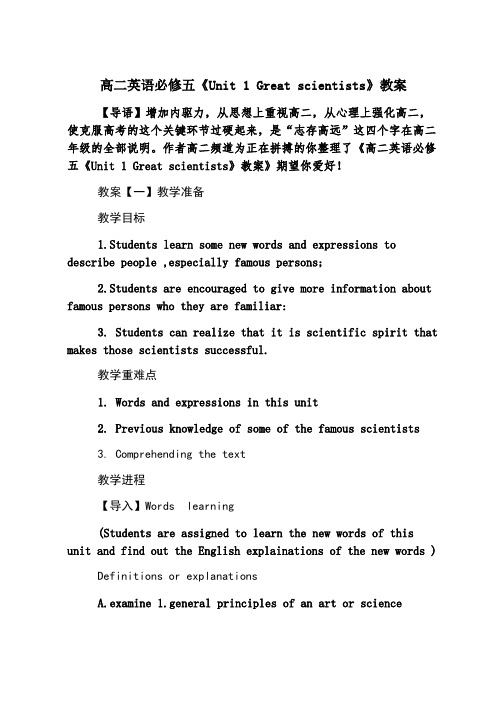
高二英语必修五《Unit 1 Great scientists》教案【导语】增加内驱力,从思想上重视高二,从心理上强化高二,使克服高考的这个关键环节过硬起来,是“志存高远”这四个字在高二年级的全部说明。
作者高二频道为正在拼搏的你整理了《高二英语必修五《Unit 1 Great scientists》教案》期望你爱好!教案【一】教学准备教学目标1.Students learn some new words and expressions to describe people ,especially famous persons;2.Students are encouraged to give more information about famous persons who they are familiar:3. Students can realize that it is scientific spirit that makes those scientists successful.教学重难点1. Words and expressions in this unit2. Previous knowledge of some of the famous scientists3. Comprehending the text教学进程【导入】Words learning(Students are assigned to learn the new words of thisunit and find out the English explainations of the new words )Definitions or explanationsA.examine 1.general principles of an art or scienceB.repeat 2.say or do againC.theory 3.at once; without delayD.immediate 4.look at...carefully in order to learn about or from...EXplete 5.of great value, worth or useF.valuable 6.having all its parts; whole; finishedG.announce 7.make knownH.control 8Xe or bring to an endI.positive 9.power to order or directJ.conclude 10.quite certain or sure【讲授】useful sentences learning(The sentences are picked from the text.)1.“All roads lead to Rome, ”he encouraged me after I failed the entrance examination.2.This sentence doesn’t make any sense.3.Our English teacher is not only strict with us but also friendly to us.4.He is good-looking, apart from his nose.5.It is announced that the spacecraft, Shenzhou Ⅵ, landed on the earth successfully.6.It is not Tom but you who are to blame.7.In 1995, the Chinese government put forward a planfor“rejuvenating the nation by relying on science andeducation”.And it has helped Chinese scientists make many breakthroughs.8.Have you drawn any conclusion after you read this passage?9.Well done.So much for the learning of the new words and expressions.【讲授】Introduction of a classic articleTeacher introduce a famous person --Qian Xuesen and students learn to write an article about the famous scientis using the words and expressions they just learn in class.【活动】Share the outcomeStudents share their article orally and discuss whether they have used some good and advanced expressions.【练习】Consolidation完成句子(1)爱因斯坦被认为是二十世纪最伟大的科学家之一。
人教版高中英语必修五教案(全册)
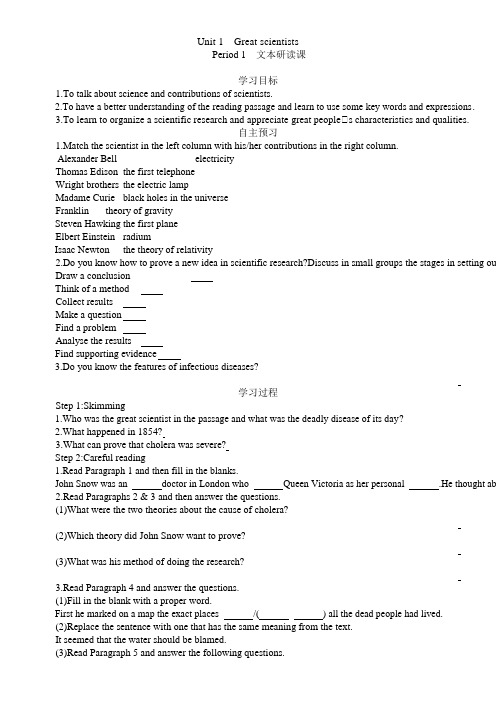
Unit 1Great scientistsPeriod 1文本研读课学习目标1.To talk about science and contributions of scientists.2.To have a better understanding of the reading passage and learn to use some key words and expressions.3.To learn to organize a scientific research and appreciate great people s characteristics and qualities.自主预习1.Match the scientist in the left column with his/her contributions in the right column.Alexander Bell electricityThomas Edison the first telephoneWright brothers the electric lampMadame Curie black holes in the universeFranklin theory of gravitySteven Hawking the first planeElbert Einstein radiumIsaac Newton the theory of relativity2.Do you know how to prove a new idea in scientific research?Discuss in small groups the stages in setting ou Draw a conclusionThink of a methodCollect resultsMake a questionFind a problemAnalyse the resultsFind supporting evidence3.Do you know the features of infectious diseases?学习过程Step 1:Skimming1.Who was the great scientist in the passage and what was the deadly disease of its day?2.What happened in 1854?3.What can prove that cholera was severe?Step 2:Careful reading1.Read Paragraph 1 and then fill in the blanks.John Snow was an doctor in London who Queen Victoria as her personal .He thought ab 2.Read Paragraphs 2 & 3 and then answer the questions.(1)What were the two theories about the cause of cholera?(2)Which theory did John Snow want to prove?(3)What was his method of doing the research?3.Read Paragraph 4 and answer the questions.(1)Fill in the blank with a proper word.First he marked on a map the exact places /() all the dead people had lived.(2)Replace the sentence with one that has the same meaning from the text.It seemed that the water should be blamed.(3)Read Paragraph 5 and answer the following questions.①Why did John Snow tell people to remove the handle from the pump?②What happened after the handle was removed?(4)Read Paragraph 6 & 7 and answer the following questions.①Where did the woman live and what had she delivered to her house every day?②What did their deaths suggest?③What measures did John Snow take to prevent the disease from spreading?Step 3:Summary2.Fill in the blanks.John Snow was a well-known in London in the 19th century.He wanted to find the of cholera in课后作业1.Read the text again.2.Try to retell the text with only a few sentences.Period 2知识讲练课学习目标1.Grasp 6 words and 2 phrases in this period;learn to express yourselves by using them.2.Learn the method of constructing knowledge trees through self-study and cooperative exploration.3.Enjoy the fun of expressing yourself using English and participate in class with a strong passion.学习过程一、词汇精粹1.conclusion n.结论;结束【教材原句】Draw a conclusion.得出结论。
高二人教版英语必修5 Unit 1-2 复习巩固教案
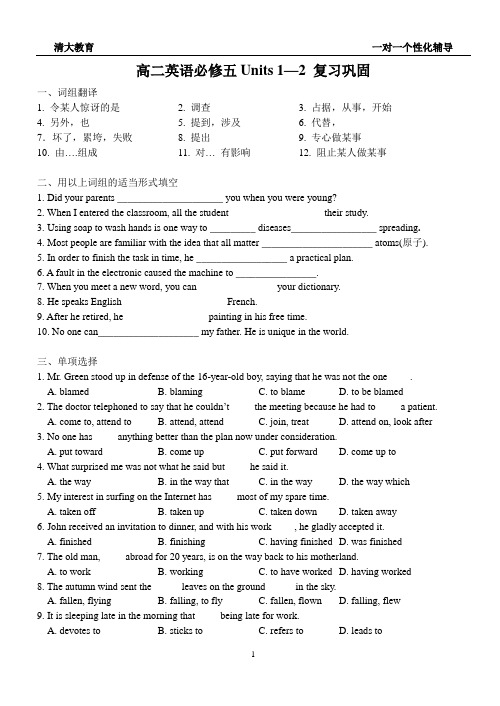
高二英语必修五Units 1—2 复习巩固一、词组翻译1. 令某人惊讶的是2. 调查3. 占据,从事,开始4. 另外,也5. 提到,涉及6. 代替,7.坏了,累垮,失败8. 提出9. 专心做某事10. 由….组成11. 对…有影响12. 阻止某人做某事二、用以上词组的适当形式填空1. Did your parents _____________________ you when you were young?2. When I entered the classroom, all the student __________________ their study.3. Using soap to wash hands is one way to _________ diseases_________________ spreading.4. Most people are familiar with the idea that all matter ______________________ atoms(原子).5. In order to finish the task in time, he __________________ a practical plan.6. A fault in the electronic caused the machine to ________________.7. When you meet a new word, you can _______________ your dictionary.8. He speaks English ____________________ French.9. After he retired, he ________________ painting in his free time.10. No one can____________________ my father. He is unique in the world.三、单项选择1. Mr. Green stood up in defense of the 16-year-old boy, saying that he was not the one ____.A. blamedB. blamingC. to blameD. to be blamed2. The doctor telephoned to say that he couldn’t ____ the meeting because he had to ____ a patient.A. come to, attend toB. attend, attendC. join, treatD. attend on, look after3. No one has ____ anything better than the plan now under consideration.A. put towardB. come upC. put forwardD. come up to4. What surprised me was not what he said but ____ he said it.A. the wayB. in the way thatC. in the wayD. the way which5. My interest in surfing on the Internet has ____ most of my spare time.A. taken offB. taken upC. taken downD. taken away6. John received an invitation to dinner, and with his work ____, he gladly accepted it.A. finishedB. finishingC. having finishedD. was finished7. The old man, ____ abroad for 20 years, is on the way back to his motherland.A. to workB. workingC. to have workedD. having worked8. The autumn wind sent the _____ leaves on the ground _____ in the sky.A. fallen, flyingB. falling, to flyC. fallen, flownD. falling, flew9. It is sleeping late in the morning that ____ being late for work.A. devotes toB. sticks toC. refers toD. leads to10. What he said ____. He knows nothing about the intelligence economy.A. make some senseB. makes some senseC. make no senseD. doesn’t make any sense11. Only when your identity has been checked, ______.A. you are allowed inB. you will be allowed inC. will you allow inD. will you be allowed in12. ______, I lost heart in English learning, but my teacher often said to me, “Keep on working hard;you’ll succeed ______.”A. At a time, in timeB. At a time, on timeC. At one time, in timeD. At one time, on time13. ____ with so much trouble, we failed to complete the task on time.A. FacedB. FaceC. FacingD. To face14. _____ and happy, Tony stood up and accepted the prize.A. SurprisingB. SurprisedC. Being surprisedD. To be surprising15. The computer system _____ suddenly while he was searching for information on the Internet.A. broke downB. broke outC. broke upD. broke16. It was after he got what he had desired ____ he realized it was not so important.A. thatB. whenC. sinceD. as17. _____ in 1636, Harvard is one of the most famous universities in the United States.A. Being foundedB. It was foundedC. FoundedD. Founding18. The building was named Ford Hall ____ a man named James Ford.A. in need ofB. in memory ofC. in charge ofD. in search of19. ____ impressed me most was his honesty and bravery.A. ThatB. AllC. WhoD. What20. ---Can you read the sign, sir? No smoking allowed in the lift! ---______.A. Never mindB. Don’t mention itC. Sure, I don’t smokeD. Pardon me四、完成句子1. 每次我去看他,他都是在看书。
人教版必修5英语Unit1_语言知识点课 教学设计
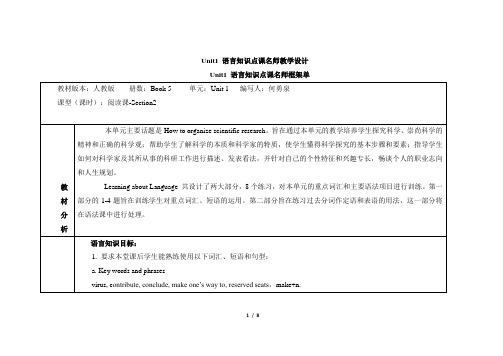
S: Complete the sentences according to the questions to revise what they have known about John Snow.
1).Don'texpose(暴露)your skin to the sun for too long.
2).Neitheryounor(既不…也不) he is right.
3).Every time(每当)I meet him, I always think of the things having happened between us.
【课时】第2课时
【课型】Learning about language(语言知识点课)
【本课时教学设计】
步骤
过程
措施(教师活动与学生活动)
目的
持续性评价
DELC4
1
预备与激活先期知识
Step 1
Revision(5mins )
Teacher help students revise what they have known about John Snow .
2). Neither its course nor its cure was understood.
3). So many thousands of terrified people died every time there was an outbreak.
4). It seemed that the water was to blame.
新课标人教版高中英语必修五UNIT1教案已修改
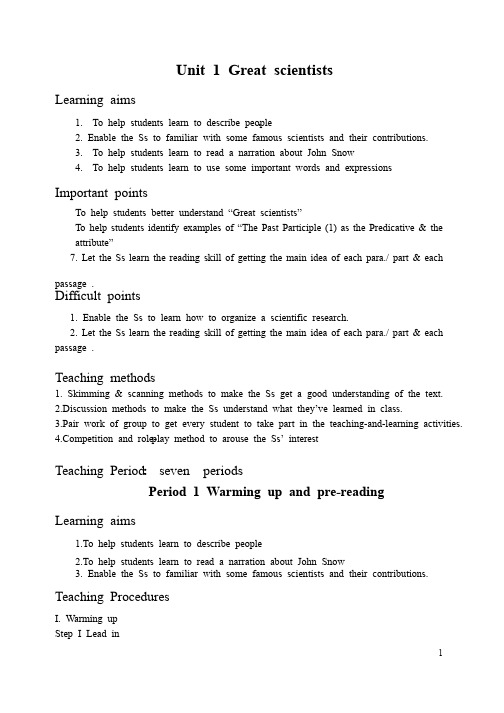
Unit 1 Great scientists Learning aims 1. To help students learn to describe people 。
2. Enable the Ss to familiar with some famous scientists and their contributions. 3. To help students learn to read a narration about John Snow 4. To help students learn to use some important words and expressions Important points To help students better understand “Great scientists”To To help help help students students students identify identify identify examples examples examples of of of “The “The “The Past Past Past Participle Participle Participle (1) (1) (1) as as as the the the Predicative Predicative Predicative & & & the the attribute”7. 7. Let Let Let the the the Ss Ss Ss learn learn learn the the the reading reading reading skill skill skill of of of getting getting getting the the the main main main idea idea idea of of of each each each para./ para./ para./ part part part & & & each each passage . Difficult points 1. Enable the Ss to learn how to organize a scientific research. 2. 2. Let Let Let the the the Ss Ss Ss learn learn learn the the the reading reading reading skill skill skill of of of getting getting getting the the the main main main idea idea idea of of of each each each para./ para./ para./ part part part & & & each each passage . Teaching methods 1. Skimming & scanning methods to make the Ss get a good understanding of the text. 2.2.Discussion methods to make the Ss understand what they’ve learned in class.Discussion methods to make the Ss understand what they’ve learned in class.3.Pair work of group to get every student to take part in the teaching-and-learning activities. petition and role-play method to arouse the Ss’ interestTeaching Period : seven periods Period 1 Warming up and pre-reading Learning aims 1.To help students learn to describe people 2.To help students learn to read a narration about John Snow 3. Enable the Ss to familiar with some famous scientists and their contributions. Teaching Procedures I. Warming up Step I Lead in Talk about scientist. T: Hi, morning, class. Nice to see you on this special day, the day when when you become a you become a senior two grader. I am happy to be with you helping you with your English. Today we are to read about a certain scientist. But first let’s define the word “scientist”. What is a scientist?A A scientist scientist scientist is is is a a a person person person who who who works works works in in in science, science, science, trying trying trying to to to understand understand understand how how how the the the universe universe universe or or other things work. Scientists Scientists can can can work work work in in in different different different areas areas areas of of of science. science. science. Here Here Here are are are some some some examples: examples: examples: Those Those Those that that study physics are physicists. Those that study chemistry are chemists. Those that study biology are biologists. Step II Ask the students to try the quiz and find out who knows the most. T: T: There There There are are are some some some great great great scientific scientific scientific achievements achievements achievements that that that have have have changed changed changed the the the world. world. world. Can Can Can you you name name some some some of of of them? them? them? What What What kind kind kind of of of role role role do do do they they they play play play in in in the the the field field field of of of science? science? science? Do Do Do these these achievements achievements have have have anything anything anything in in in common? common? Match Match the the the inventions inventions inventions with with with their their their inventors inventors inventors below below before you answer all these questions. 1. Archimedes, Ancient Greek (287-212 BC), a mathematician. 2. Charles Darwin, Britain (1808-1882). The name of the book is Origin of Species. 3. Thomas Newcomen, British (1663-1729), an inventor of steam engine. 4. Gregor Mendel, Czech, a botanist and geneticist. 5. Marie Curie, Polish and French, a chemist and physicist. 6. Thomas Edison, American, an inventor. 7. Leonardo da Vinci, Italian, an artist. 8. Sir Humphry Davy, British, an inventor and chemist. 9. Zhang Heng, ancient China, an inventor. 10. Stepper Hawking, British, a physicist. II. Pre-reading Step I Get Get the the the students students students to to to discuss discuss discuss the the the questions questions questions on on on page page page 1 1 1 with with with their their their partners. partners. partners. Then Then Then ask ask ask the the students to report their work. Encourage the students to express their different opinions. 1. What do you know about infectious diseases? Infectious diseases can be spread to other people. They have an unknown cause and need public health care to solve them. People may be exposed to infectious disease, so may animals, such as bird flu ,AIDS, SARS are infectious diseases. Infectious diseases are difficult to cure. 2. What do you know about cholera? Cholera is the illness caused by a bacterium called Vibrio cholerae. It infects people’s intestines(肠), causing diarrhea and leg cramps (抽筋).The most common cause of cholera is by someone eating food or drinking water that has been contaminated(污染) with the bacteria. Cholera can be mild(不严重的) or even without immediate symptoms(症状), but a severe case can lead to death without immediately treatment. 3. Do you know how to prove a new idea in scientific research? Anybody might come out with a new idea. But how do we prove it in scientific research? There are seven stages in examining a new idea in scientific research. And they can be put in the following order. What order would you put the seven in? Just guess. Find a problem→ Make up a question→ Think of a method→ Collect results→Analyse the results→ Draw a conclusion→ Repeat if necessary III. Homework 1.Finish the EX1,2and 3on Page 3. 2.Read the article on Page 2 loudly. IV.Teaching reflection Period 2 ReadingLearning aims 1.To help students learn to read a narration about John Snow To help students better understand “Great scientists”2.2.To help students better understand “Great scientists”Teaching Procedures Step I Pre-reading 1.Do you know John Snow? London and he defeated “King John Snow is a well-known doctor in the 19th century in Cholera”.2.Do you know what kind of disease is cholera? It is a kind of terrible disease caused by drinking dirty water and it caused a lot of deaths in the old times and it was very difficult to defeat. Let’s get to know how Dr. John Snow defeated “King Cholera” in 1854 in London in this reading passage: Step II Skimming Read the passage and answer the questions.1.Who defeats “King Cholera“? (John Snow) 2.What happened in 1854? (Cholera outbreak hit London.) 3.How many people died in 10 days? (500) 4.Why is there no death at No. 20 and 21 Broad Street as well as at No. 8 and 9 Cambridge Street? (These families had not drunk the water from the Broad Street pump.) (Optional) Skim the passage and find the information to complete the form below. Who When What How Result John Snow 1854 helping ordinary people exposed to cholera Examining Examining the the the source source source of of all water supplies and finding new methods of dealing with polluted waster “King Cholera” defeated Step III Scanning Read the passage and number these events in the order that they happened. 2 John Snow began to test two theories. 1 An outbreak of cholera hit London in 1854. 4 John Snow marked the deaths on a map. 7 He announced that the water carried the disease. 3 John Snow investigated two streets where the outbreak was very severe. 8 King Cholera was defeated. 5 He found that most of the deaths were near a water pump. 6 He had the handle removed from the water pump. Step IV Main idea and correct stage Read the passage and put the correct stages into the reading about research into a disease. John Snow Defeats “King Cholera”Paragraph Stages General ideas 1 Find a problem: What cause the cholera? The causes of cholera 2 Make up a question: Which is right? The correct or possible theory 3 Think of a method: Test two theory Collect data on where people were ill and died and where they got their water 4 Collect results: Mark the death Plot Plot information information information on on on a a a map map map to to to find find find out out out where where people died or did not die 5 Analyze the results: Find the resource of the water Look into the water to see if that is the cause of the illness 6 Find supporting evidence Find other evidences to confirm his conclusion 7 Draw a conclusion The polluted dirty source of drinking water was to blame for the cause of the London cholera Step V Group discussion Answer the questions (Finish exercise 2 on Page 3) 1. John Snow believed Idea 2 was right. How did he finally prove it? (John Snow finally proved his idea because he found an outbreak that was clearly related to cholera, collected information and was able to tie cases outside the area to the polluted water.) 2. Do you think John Snow would have solved this problem without the map? (No. (No. The The The map map map helped helped helped John John John Snow Snow Snow organize organize organize his his his ideas. ideas. ideas. He He He was was was able able able to to to identify identify identify those those households households that had that had had had many many many deaths deaths deaths and and check check their water-drinking their water-drinking habits. habits. He He identified those houses that had had no deaths and surveyed their drinking habits. The evidence clearly pointed to the polluted water being the cause.) 3. Cholera is a 19th century disease. What disease do you think is similar to cholera today? (Two (Two diseases, diseases, diseases, which which which are are are similar similar similar today, today, today, are are are SARS SARS SARS and and and AIDS AIDS AIDS because because because they they they are are are both both serious, have an unknown cause and need public health care to solve them.) Step VI Homework 1.Remmber the words and expressions of the article. ing the stages for scientific research and write a summary. 3.Finish P4, Ex 1,2(on SB) Ex3 make sentences on exercisebook (make one ’s way to, make up one one’’s mind, make sure, make room for) 4.Find out the phrases according to the Chinese (part 1 on the paper for language points) 5.Retell the story John Snow Defeats “King Cholera” by following the 7 steps on p1 6. Read notes to Unit 1, p78-79, find out some difficult points while reading the text IV .Teaching reflection Period 3 Language focusLearning aims 1.1.To help students better understand “Great scientists”To help students better understand “Great scientists”2.To help students learn to use some important words and expressions Teaching Procedures Step I Homework checking. Step II. Expressions & phrases 1.know about… 了解……的情况的情况2.lift up 举起;抬起;提升提升3.steam engine 蒸汽机蒸汽机4.physical characteristic 人体的特征人体的特征5.put forward a theory about black holes 提出一个有关黑洞的理论提出一个有关黑洞的理论6. infectious disease 传染性的疾病传染性的疾病7. in scientific research 在科学研究上在科学研究上8. examine a new scientific idea 验证一个新的科学思想验证一个新的科学思想9. draw a conclusion 得出结论得出结论 10. analyze the results 分析结果分析结果 11. a well-known doctor 一个著名的医一个著名的医生12. ordinary people 百姓;普通人普通人13. expose (…)to sth. 暴露(…..)在……中14. the most deadly disease 最致命的疾病最致命的疾病 15. terrified people 被吓坏的人们被吓坏的人们 16. get interested in sth./doing sth.产生兴趣对…产生兴趣17. absorb sth. into… 把….吸收入….18. gather the information 收集信息收集信息19. determine to do sth. 决心干某事决心干某事 20. a valuable clue 一条珍贵的线索一条珍贵的线索 21. the water pump 水泵水泵22. in addition (to…) 除..…之外还有… 23. link … to … 将…和…联系起来联系起来(be linked to…)24. have it delivered (have sth. done) 叫某人送东西叫某人送东西25. die of… 死于…26. announce with certainty 肯定地宣布肯定地宣布 27. polluted water 被污染的水被污染的水 28. prevent sb. from doing sth.阻止某人干某事阻止某人干某事29. deal with… 处理……30. solve the problem 解决难题解决难题 Expressions & Phrases (2) e to an end 到了尽头到了尽头2.find the cause of this illness 找出疾病的起因找出疾病的起因3.look into… 调查……4.apart from…除…之外;此外此外 (=except for…)5.prepare for… 预备好….6.be strict with sb. 对某人严格要求对某人严格要求7.a revolutionary theory 一个革命性的理论一个革命性的理论8.lead to… 通向…. ;导致导致… (注意注意:to 为介词) 9.make sense 有意义有意义10. at times =sometimes 有时候有时候11. contribute to sth. 有助于;促进促进12. encourage sb. to do sth. 鼓励某人做某事鼓励某人做某事 13. point of view 观点观点14. living conditions 居住条件居住条件15. break… in/into pieces 把…摔成碎块摔成碎块16. be devoted to sth./sb.专致于.; 关心;挚爱…17. devote one’s life to doing sth. 献身于….. 18. curved line 曲线曲线19. achieve great success 取得巨大的成功取得巨大的成功Step IV . Language Points 1.discover & invent discover v. “ 发现” 被探索或被揭示的事物早已客观存在着. Eg. 1)Columbus discovered America in 1492.哥伦布于1492年发现了美洲. 2)Who discovered radium? 谁发现了镭? invent v. “发明”,指的是发明原先不存在的东西. Eg.Who invented the steam engine? 谁发明了蒸汽机? 2.who invented the way of giving electricity to everybody in large cities?是谁发明了把电带给大城市中的每个人的办法? the way of doing sth.= the way to do sth … “做…..的方法”She showed us the way of cleaning it.= She showed us the way to clean it.她教给我们清洗它的办法. the way 引导的定语从句的引导词有三种, 可以用that;可以用in which;还可以省略还可以省略. Eg.Eg.I don’t like the way (that I don’t like the way (that / in which) you speak to your father. 我不喜欢你跟你父亲讲话的方式. 与way 相关的短语: by the way 顺便说顺便说顺便说 by way of … 通过……的方法,经,由的方法,经,由lose one’s w ay way 迷路迷路 no way (俚语) 没门,别想别想feel one’s way 摸黑走摸黑走,谨慎从事谨慎从事 on one’s way to…在去…的路上的路上in this way=by this means=with this method 用这种方法用这种方法3.Who put forward a theory about black holes?谁提出了黑洞的理论? put forward (1) to offer (an idea, suggestion etc.) for consideration 提出(建议等) (2)推荐某人或自己任职位;提名提名Eg.May I put your name forward as our monitor? 我能否提名你当我们的班长? put away 抛弃;舍弃舍弃 put down 写下来;记入名单; put on 穿上;戴上;增加增加 put off 耽误;延期延期put out 熄灭(灯);扑灭扑灭 (火) put up 建立;建造建造 put up with… 忍受…… •ou Y ou can can can take take anything anything from from from the the the shelf shelf shelf and and and read, read, read, but but but please please please ______ ______ ______ the the the books books books when when when you’ve you’ve finished with them. A. put on B. put down C. put back D. put off 4.This was the most deadly disease of its day. die (v.) dead (adj.) death (n.) deadly (adj.) adj. (1).dangerous; likely to cause death 危险的;致命的致命的 a deadly disease/weapon (2). highly effective against sth. or sb 不强有力的;致命的致命的 a deadly remark 击中要害的评论的评论(3)aiming to kill or destroy 意在杀死的;不共戴天的: a deadly enemy 不共戴天的敌人的敌人adv. (1). V ery 极度;非常;十分: deadly serious 十分认真十分认真(2). like death 死一般地死一般地: deadly pale 死一般苍白死一般苍白5.But he became inspired when he thought about helping ordinary people exposed to cholera. expose 在句中是过去分词作后置定语,表示被动.意为“患霍乱的”.如:The book written by Luxun is very popular. expose v. (1)to make visible 暴露暴露暴露 “expose ….to….” eg.He exposes his skin to the sun. 他把皮肤暴露在阳光下. (2)t (2)to reveal the guilt or wrong doing of …o reveal the guilt or wrong doing of …揭露;揭发揭发 eg.He exposed their plot.他揭穿了他们的阴谋. I threatened to expose him ( to the police).我威胁要(向警察)揭发他. expose to 使易受,使受使受 expose a fraud 揭穿骗局揭穿骗局expose sth. to the light of day 把某事暴露于光天化日之下把某事暴露于光天化日之下6. So many thousands of terrified people died every time there was an outbreak.每次爆发霍乱时就有大批惊慌的老百姓病死. every time 是连词,引导时间状语从句,意为“每次,每当”,如: Every time I meet him, I always think of the things happened between us. 每次见到他,我就想起发生在我们之间的事情. immediately, the the moment, moment, moment, directly, directly, instantly 等都可以作连词,引导时间状语从句,意为“一……就……”,eg. 1)I will give the letter to him immediately I see him.我一见到他就把这封信给他. 2)I came directly I got your letter.我一接到你的信就来了. 7.The first suggested that cholera multiplied in the air without reason.第一种看法是霍乱病毒在空气中无缘无故地繁殖着.(Suggest 用法参考P43.4,并完成相关的练习) 8.absorb v. 吸收(液体);承受;承担承担 (费用等) Eg.1)Use the cloth to absorb the spilled ink. 吸干撒的墨水吸干撒的墨水2)We will not absorb these charges.我们不能承担这些费用. absorb…in/by..吸引.注意注意eg.eg.I was absorbed in a book and didn’t hear you call.I was absorbed in a book and didn’t hear you call.专心看书专心看书absorb…into…吸收…eg.The big company has gradually absorbed these small companies into its own organization. 这家大公司逐渐将这些小的公司吞并了。
人教新课标高中英语必修5Unit1教案1
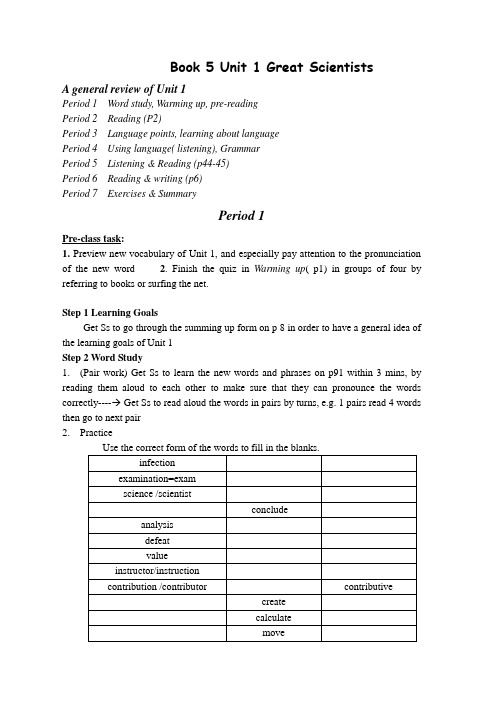
Book 5 Unit 1 Great ScientistsA general review of Unit 1Period 1 Word study, Warming up, pre-readingPeriod 2 Reading (P2)Period 3 Language points, learning about languagePeriod 4 Using language( listening), GrammarPeriod 5 Listening & Reading (p44-45)Period 6 Reading & writing (p6)Period 7 Exercises & SummaryPeriod 1Pre-class task:1. Preview new vocabulary of Unit 1, and especially pay attention to the pronunciation of the new word2. Finish the quiz in Warming up( p1) in groups of four by referring to books or surfing the net.Step 1 Learning GoalsGet Ss to go through the summing up form on p 8 in order to have a general idea of the learning goals of Unit 1Step 2 Word Study1. (Pair work) Get Ss to learn the new words and phrases on p91 within 3 mins, by reading them aloud to each other to make sure that they can pronounce the words correctly---- Get Ss to read aloud the words in pairs by turns, e.g. 1 pairs read 4 words then go to next pair2. Practiceinfectionexamination=examscience /scientistconcludeanalysisdefeatvalueinstructor/instructioncontribution /contributor contributivecreatecalculatemovecompletionenthusiasm3.1)Mrs. White bought a pan with a long ________. (handle)2)The pollution is so ________ that we have to take some measures to stop it.(severe)3)He has a big nose that is a ________ of his family. (characteristic)4)Water and salt are ________ into our blood stream every day. (absorbed)5)If a doctor or a medical treatment ________ someone’s illness, they make theperson well again. (cure)Step 3. Warming up(Group competition) Check the answers to the quiz to find out which group know the most . Show pictures to introduce some scientists while Ss giving the correct answers-- congratulations to the winning groupStep 4 Pre-reading1. (Pair work) What five most important qualities do you think a scientist should have? Give reasons.clever/talented strict patient creative determined/strong-willed positivehonest energetic intelligent/hard-working ambitious careful co-operative confident brave2. (Group work) Ex2, p1Do you know how to prove a new idea in scientific research? Discuss in groups the stages in examining a new scientific idea. What order would you put them in?Draw a conclusion Think of a method Collect results Make up a questionFind a problem Analyse the resultsStep 5. Summary1.Seeing much, suffering much, and studying much are three pillars (支柱,要素) oflearning.2.learning without thought is a labour lost; thought without learning is perilous(危险的)3. To know the disease is half the cure. 找出病根等于医治了一半。
人教版英语必修五Unit 1 复习课教学设计方案
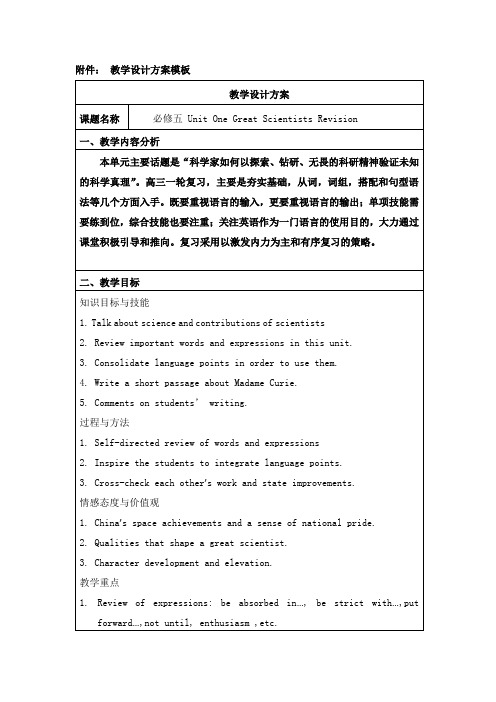
拓展
对知识理解和技能转化达到了台阶目标,对教材内容有一定程度的拓展了解并掌握。不同层次的学生都有收获。
15分
评价
本节课学懂的内容,知识理解到位,转化的技能掌握。学习心态、学习方法策略有了提高。
15分
五环节
目标展示
目标明确、具体、得当,关注学生差异。
5分
自主学习
学生有自主学习的时间和空间
5分
合作探究
大多数学生(80%)主动参与教学,达到一定的时间(1/3课堂教学时间),学生思维活跃,在师生、生生交流中能提出问题、解决问题。个人创新思维的闪光点。
15分
拓展提高
复习内容有层次性,中高考科目有直击中高考的试题,每位学生都有跳着摘果子的欲望。
10分
反思感悟
学生谈本节课收获或师生共同梳理本节课知识网络,教师总结,并升华学生思想,进行科学的引领。
Step Two Revision of words, phrases and sentence patterns.
Just now we learned aboutChina’s successful launch of Shenzhou XI manned spacecraft, from which we are exposed to some new expressions.
Let’s review some important expressions in this unit.
Heis absorbed inthe study of space medicine.
…
设计目的:引入复习内容,贯彻学以致用原则。鼓励学生用表达法进行造句。复习也是为下面的微写作打基础。
Step Three Mini Writing
高二英语必修五第一单元教案设计
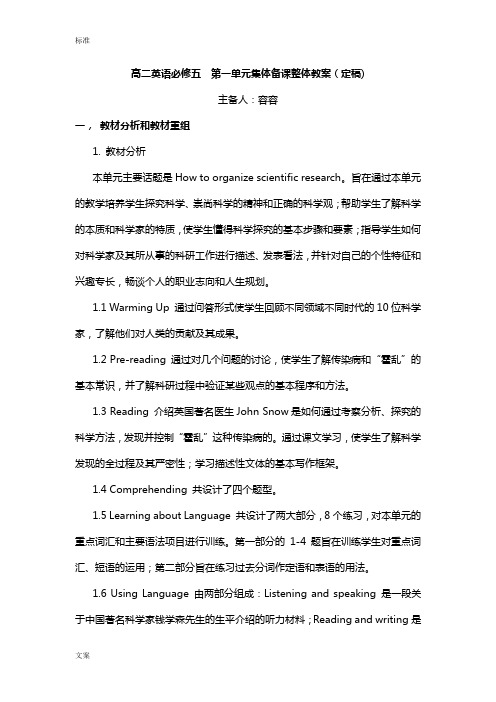
高二英语必修五第一单元集体备课整体教案(定稿)主备人:容容一,教材分析和教材重组1. 教材分析本单元主要话题是How to organize scientific research。
旨在通过本单元的教学培养学生探究科学、崇尚科学的精神和正确的科学观;帮助学生了解科学的本质和科学家的特质,使学生懂得科学探究的基本步骤和要素;指导学生如何对科学家及其所从事的科研工作进行描述、发表看法,并针对自己的个性特征和兴趣专长,畅谈个人的职业志向和人生规划。
1.1 Warming Up 通过问答形式使学生回顾不同领域不同时代的10位科学家,了解他们对人类的贡献及其成果。
1.2 Pre-reading 通过对几个问题的讨论,使学生了解传染病和“霍乱”的基本常识,并了解科研过程中验证某些观点的基本程序和方法。
1.3 Reading 介绍英国著名医生John Snow是如何通过考察分析、探究的科学方法,发现并控制“霍乱”这种传染病的。
通过课文学习,使学生了解科学发现的全过程及其严密性;学习描述性文体的基本写作框架。
1.4 Comprehending 共设计了四个题型。
1.5 Learning about Language 共设计了两大部分,8个练习,对本单元的重点词汇和主要语法项目进行训练。
第一部分的1-4题旨在训练学生对重点词汇、短语的运用;第二部分旨在练习过去分词作定语和表语的用法。
1.6 Using Language 由两部分组成:Listening and speaking 是一段关于中国著名科学家钱学森先生的生平介绍的听力材料;Reading and writing是一段关于伟大天文学家哥白尼发表“日心说”过程的短文。
2.教材重组2.1 将Warming Up,Pre-reading, Reading和Comprehending三部分整合为一节“精读课”。
2.2 重点讲解Reading中的语言点,句子结构为一节课。
- 1、下载文档前请自行甄别文档内容的完整性,平台不提供额外的编辑、内容补充、找答案等附加服务。
- 2、"仅部分预览"的文档,不可在线预览部分如存在完整性等问题,可反馈申请退款(可完整预览的文档不适用该条件!)。
- 3、如文档侵犯您的权益,请联系客服反馈,我们会尽快为您处理(人工客服工作时间:9:00-18:30)。
vt.[səˈspekt]猜想;怀疑
n.[ˈsʌspekt]可疑对象;嫌疑犯
①blame sb.forsth.
②blamesth.forsb.
③sb.beto blame (forsth.)
1强调,加强语气;
2e.g. I want to change the materialused.
3某些过去分词习惯用作后置定语;
e.g.
4修饰词为复合不定代词something,nothing,somebody等或指示代词those,these等时。
【常用系动词:①状态系动词:be②感官系动词:feel, smell, sound, taste③表象系动词:look, seem, appear④持续系动词:keep, remain⑤变化系动词:become, turn, grow】
attend
参加会议、典礼、讲座、婚礼等等
join
加入某团队成为其中一员(参军、入党、加入社团等)
join Leabharlann n参加某项活动take part in
参加(讨论、辩论或群体性活动),暗示以积极角色参与
肇庆期末题型
阅读理解40完形填空30语法填空15词汇基础15写作35(短文改错10+书面表达25)
